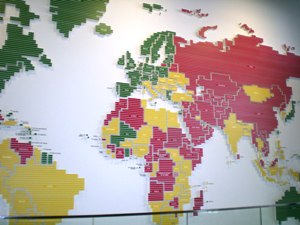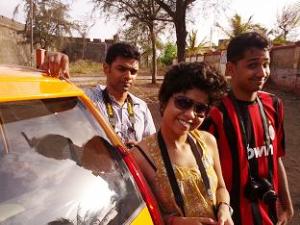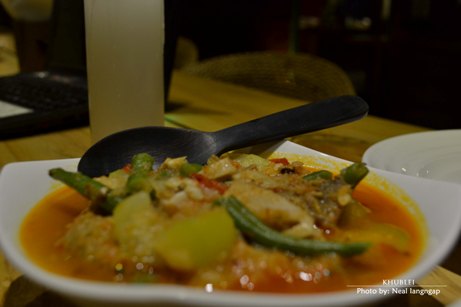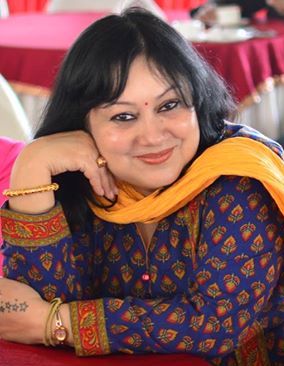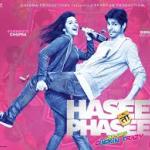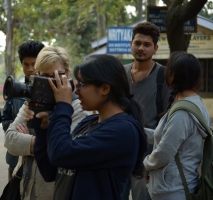"Maaa, don't go out now. Big rains have come and the road is full of wet."
I laughed, unable to resist hugging the little moppet. That was my niece Anagha, calling out to her mother Vidya, my one & only sibling.
Vidya had come home for the weekend. The two of us were all set to step out for our evening walk, when this four-year-old stumped us with her weather warning. In vivid, visual English.
'Graphic' English has always fascinated me. I remember the time a friend spoke of her son's first visit to the dentist for a toothache. The doctor plonked him on a chair and asked him where it pained. He opened his mouth wide and said, "My upstairs teeth.''
Wrong English when spoken by kids draws giggles; when spoken by adults, sniggers. Mostly.
The way we Indians use the Queen's Language has made the life & livelihood of many a stand-up comedian. It gives endless PhD theses material and enriches office parties. Lately, it revived the career of retired movie diva Sridevi. With a movie title that says it like it is, English Vinglish.
E-V, as director Gauri Shinde has said ad-nauseum in every film interview, is a tribute to her mother.
"It's my way of saying sorry to my mother," she says. She explained that Sridevi's homemaker character Shashi in the movie is much like Gauri's own mother who couldn't speak English and how she as a young girl growing up in Pune was somewhere ashamed and had a complex about it.
One of the first scenes in the movie is that of a family around the dining table, Shashi serving them food and asking her teenage daughter how her Jauss class went. To which the girl makes sly eye contact with her dad, and wickedly corrects her with a jibe, "Ma, woh jauss nahi, Jazz hai".
And there, lies a tale. When Shashi inevitably has to go to New York for her niece's wedding and all by herself for the first time, she lands in a soup at an American cafe. Stressed out, shocked and shamed at not being able to order a simple cup of coffee & toast, Shashi steels herself to learn the language, a helpful set of circumstances leading her to an English-learning class that promises fluency in four weeks.
I do not intend this article to be a stealthy publicity vehicle for the film. But English Vinglish surely left me asking myself some disturbing questions. And analysing some of our deep-set daily behaviour - why we yell out to our kids in deliberate English when in public, switch to angrezi in certain social circles, and seldom show the same josh in wanting to know, read or speak our own mother languages better.
In the movie, Shashi Godbole the simple housewife who can make deadly laddoos but not manage a straight line of English Vinglish, finds herself in the midst of a whole bunch of atrocious English speakers in the New York class. There is a Spanish nanny, an attractive Chinese girl, a French chef… but for all of them, English is just a tool of convenience to get by in their daily lives, not a matter of prestige, self-esteem or 'izzat', like it is for Shashi or the South Indian techie Ram Subramaniam.
Does he agree with this observation? I ask Rajeev Ravindranath, fellow Bangalorean who plays Ram in the movie, and he proffers, "The British left English everywhere, in people's psyche, in the social fabric of this country... Those closest to them (read powerful and influential) spoke the language better and therefore got by better than those who did not."
If that aspect added to the aspirational value of English and upping the brand of those who spoke it well, it automatically pronounced those not being able to do so as lesser beings. "Admit it. We do frown on the poorly spelt, bad grammar, broken English Facebook update. Why, even that putrid SMS lingo is more acceptable to us than incorrect tensing and mixed up vocabulary. In fact SMS lingo might be just the disguise that someone weak in English craves," analyses this theatre actor-cum-creative director of an ad agency.
Come to think of it, the divide between English speakers and those who do not, pervades every layer of our lives as Indians. If your maid was able to give it back to you in chaste English, you wouldn't dare treat her the way you do, give her hand-me-downs or day-before-yesterday's leftover dal from the fridge, would you.
If the attendant in your office were to hold his own in the videshi lingo, you would think twice before asking him to run errands for you that were beyond his brief. If the millions of our rural masses were to speak up for their rights in flawless Queen's language, would the sarkar and mining magnates have been able to subjugate them so much in the garb of complicated British Raj bureaucratese and bluster?
English in mera mahaan Bharat is tied to the right to throw attitude, and crumbs, at those who cannot speak it well, or worse, not speak it all.
And to think that I choose to make this case seemingly against a language in that very language - what conceit! But I am no English-hater. To the contrary, I love it and have hugely benefited from the love. I can be accused of some or all of these charges that I have built in the previous paragraphs. But I owe my sense, my sensibility, my profession and even this perspective, all to English!
I speak five Indian languages fluently, can read four of them and can understand two others enough to know even if the people speaking them were swearing at me, politely. And as a print journalist who turned into a radio jockey and then a television reporter, my life's learning is this: there is no better way to connect to a person than speaking in her/his own language, or at least trying to.
In a country where the dialect of a place changes by the time you drive to the next dhaba on the highway, it pays to pick up nuances of the spoken tongue. The job of a journalist is to be the voice of her people, and if the language in which the voice speaks is lost in translation, it can often completely distort the story. And that would be (heart) breaking news.
So while more Indians become confident users of Britain's bhaasha and get their 'global citizens club' card as Rajeev puts it, it would be good to not unleash English on those who do not use it.
Unless they want to be taught - now that's a legitimate wish which in places like my home state Karnataka sadly gets blocked by politicians who use the issue to bash 'Western culture' while their own kids turn out of impeccable English finishing schools.
Years back, while I was a sub-editor at the Indian Express news desk, a 'mofussil reporter' would send news of his district in beautiful handwritten sheets by post. He was prompt in filing stories for the weekly round-up column, but missed once. Apology came in quick. My boss, also a lady, opened the snail mail to read the familiar handwriting "Madam, somehow missed. Kindly bare with me this time."
Knowing from experience that the man was beyond dishonourable intentions towards the female gender, she passed the mail around to us women at work. We 'bore' the bad grammar. With a giggle - and a grin in our upstairs teeth.
Find us on facebook: facebook.com/TheThumbPrintMag










